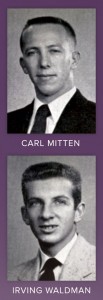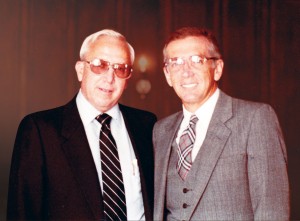In retrospect, it is difficult to believe Irving Waldman and Carl Mitten could have ever met, and almost impossible to believe they would grow so close that they still call each other “brother” nearly 65 years after meeting at the University. On paper, the Jewish transfer student from Brooklyn, N.Y., and the country kid from the northeast Missouri town of Medill should have been strangers, but fate brought them together. Their time in Kirksville solidified their friendship and their devotion to one another helped them to maintain it through the years.
If not for problems with his teeth, Irving Waldman (’54) might never have heard of Kirksville. As a freshman at New York University, Waldman was spending more time on the subway than in the classroom.
“It didn’t feel much like going to college,” he said. “All I did was get up in the morning — early — and come home late at night and study. I wasn’t enjoying it at all.”
During an office visit to check on some problems with his teeth, Waldman’s dentist told him about the University, as his brother had recently completed his studies in Kirksville. By the next fall, Waldman was enrolled, and his journey to the Midwest was an eye-opener for the lifelong city dweller.
 “I was very provincial in Brooklyn, and suddenly I was in the world,” he said. “Even though it was a small world, I was in a different world.”
“I was very provincial in Brooklyn, and suddenly I was in the world,” he said. “Even though it was a small world, I was in a different world.”
When he arrived, the men’s dorms were occupied and Waldman had to take up residence at a rooming house close to campus. One of his neighbors across the street was Carl Mitten (’54). That happenstance would turn out to be a godsend for Waldman, and in an unconventional twist, he credits the farm boy for showing him the ways of the world.
Mitten usually hitchhiked the 60-plus miles from the tiny town of Medill to the University, and although he was from an isolated part of the Midwest, he had already seen a lot of the country. Most of his summers were spent with his father on the railroad.
“I had been very sheltered and I had never been anywhere,” Waldman said. “He had been all over the Midwest in trains, and he was worldly wise. Not too good at school, but he knew his way around and he sort of taught me the ropes.”
Mitten also benefited from knowing Waldman, who was a more proficient student, and often borrowed his notes.
“Irving was book smart and I was street smart, for the Midwest rural culture,” Mitten said. “We made a great pair. I taught him how to survive in Kirksville and he helped me in classes.”
While their relationship may have started out of necessity, they quickly became close friends. When Mitten learned Waldman would not be returning to New York for Thanksgiving, he invited him to Medill, and the duo hitchhiked back to Mitten’s home. It was the first of many times they would make the trip, but Waldman still remembers that inaugural voyage.
“Talk about culture shock,” he said. “The house had no indoor plumbing. I didn’t know that existed, except in the movies.”
Mitten recalls how the city kid handled roughing it in the country.
“When we were at the farm, Irving would go to the neighbor and use the facilities since we only had an outhouse,” he said. Lack of amenities aside, the trip home for Thanksgiving solidified their friendship.
“They were lovely people,” Waldman said. “They took real good care of me for the weekend and we became fast friends.”
That weekend was also the first time Waldman ever got behind the wheel of a car — at Mitten’s urging — and it did not go well. When rounding the first curve, he promptly drove the vehicle straight into the ditch. Nevertheless, when they got back to Kirksville, Waldman was motivated enough to purchase a driver’s license at the drug store for 25 cents.
For the following three years, Mitten and Waldman were nearly inseparable. They ate meals and attended sporting events together. They ended up living on the same floor of the Sigma Tau Gamma house and they worked together selling hotdogs at football games. One year, Mitten traveled back to New York with Waldman for New Year’s Eve. Even though Waldman had a date for the evening, and Mitten did not, the farm boy made the most of his trip, and headed to Times Square for the ball drop.
“He got on the subway. He left in the evening and he came back the next morning,” Waldman said. “He was a go-getter, and nothing stopped him. Carl is very independent.”
Both men studied to be doctors, but their career paths took separate turns after graduation. That summer Mitten and his wife Lois were married, and Waldman was by his side as the best man.
“He missed the first week of med school to be there,” Mitten said.
In fact, Waldman was cutting it so close by staying in town for the ceremony, he had to leave the same day to catch the train back east, and Mitten left his own wedding reception to drop his friend off at the station.
“Lois still reminds me about that,” Mitten said.
Mitten was drafted into the Army that summer, and after serving posts around the world he also attended medical school and became a doctor. He and Lois live in Houston, Texas, where he still practices medicine full time at the age of 83. Most of his work is philanthropic in nature, and he offers free clinics about care and living with diabetes.
“It is very rewarding,” he said. “I thought about doing missionary work abroad, but I felt this area needed my support more.”
Most of Waldman’s professional career took place in Miami, Fla. After years as a radiologist, he retired in 2012, but like his friend, he donates some of his time and medical expertise. In Waldman’s case, he reads scans for Health through Walls, a nonprofit organization that works with prisons in resource-poor countries to help prevent, identify and treat contagious diseases among inmates.
As their lives have taken them on different paths, it has been tough for the pair to see each other regularly, but they have remained close. They talk on the phone, and have occasionally gotten together for face-to-face visits. In October 2014, both men returned to Kirksville for their 60th class reunion to remember some of the best times of their lives.
“College was a lot of fun, and I credit Kirksville, and Truman, for being a major part of my success as a human being and a physician. The people were wonderful,” Waldman said. “I really grew up there, because of Carl.”
“Irving is the closest thing to a brother I have ever had,” Mitten said.


